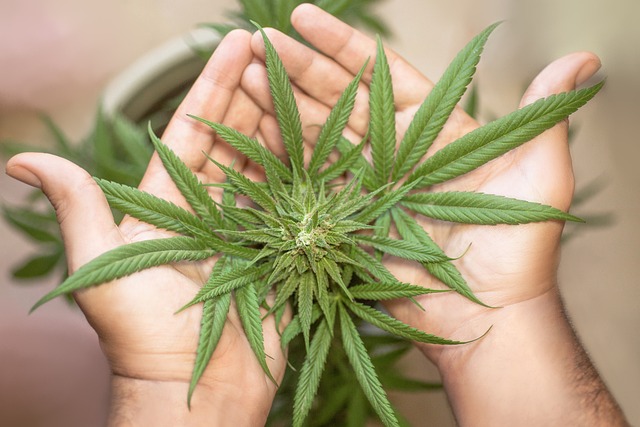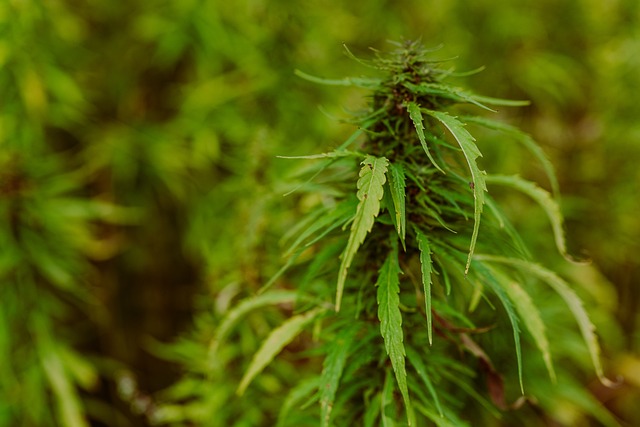The THCA flower, a non-psychoactive compound derived from the Cannabis sativa plant, has emerged as a therapeutic agent due to its potent anti-inflammatory effects. Unlike THC, it does not produce psychoactive side effects, making it a promising option for managing inflammation without mind-altering consequences. Research indicates that THCA's effectiveness lies in its ability to inhibit certain enzymes and molecules associated with inflammation. This is achieved through its interaction with the endocannabinoid system, particularly the CB1 and CB2 receptors, which can also modulate pain, appetite, and immune responses. The THCA flower's benefits are further enhanced by its synergistic combination of cannabinoids, terpenes, and flavonoids, which collectively contribute to its medicinal properties. These components not only amplify the anti-inflammatory and analgesic effects but also show potential in treating a variety of inflammatory conditions, including arthritis and colitis, as well as neurodegenerative diseases by reducing glial cell activation and neurotoxicity associated with inflammation. The THCA flower's anti-inflammatory properties make it an intriguing subject for further investigation in cannabinoid therapy.
Exploring the multifaceted role of THCA flower in health and wellness, this article delves into its anti-inflammatory properties and potential benefits for inflammation-related conditions. From understanding its composition to comparing it with other cannabinoids, we’ll navigate through the scientific research and studies that underscore its therapeutic impact. We’ll also address side effects, safety profiles, legal considerations, and best practices for storage to ensure maximum efficacy. As a natural constituent of the cannabis plant, THCA flower interacts with the endocannabinoid system, offering insights into personalized anti-inflammatory approaches. Join us as we dissect the intricacies of THCA flower and its role in inflammation management.
Understanding THCA Flower and Its Composition

The THCA flower, which stands for tetrahydrocannabinolic acid, is a natural compound found in the Cannabis sativa plant. Unlike its well-known counterpart, delta-9-tetrahydrocannabinol (THC), THCA possesses a unique profile with distinct therapeutic potentials. THCA is non-psychoactive, meaning it does not produce the ‘high’ commonly associated with cannabis use. Instead, it offers a range of health benefits that are being studied for their efficacy in managing various conditions. One of the notable effects of THCA is its anti-inflammatory properties. Research indicates that THCA can inhibit the activity of certain enzymes and molecules involved in inflammation, suggesting a role in reducing inflammatory responses within the body. This could be particularly beneficial for individuals suffering from inflammatory diseases or conditions where managing inflammation is crucial.
Furthermore, THCA’s composition includes a variety of cannabinoids, terpenes, and flavonoids, all contributing to its therapeutic effects. The primary cannabinoid, THCA itself, interacts with the body’s endocannabinoid system, potentially modulating pain sensation, appetite stimulation, and immune response. Additionally, the synergistic effect of other compounds found in the THCA flower may enhance its overall medicinal impact. For instance, terpenes, which are aromatic oils found in many plants, including cannabis, can provide additional anti-inflammatory and pain-relieving effects when present alongside THCA. This complex interplay of compounds within the THCA flower underscores its potential as a natural therapeutic agent with a diverse range of applications.
The Anti-Inflammatory Properties of THCA Flower

Delta-9-tetrahydrocannabinolic acid (THCA) is the non-psychoactive precursor to the well-known compound delta-9-tetrahydrocannabinol (THC). Found abundantly in raw cannabis flowers, THCA possesses a range of potential health benefits, with particular attention given to its anti-inflammatory properties. Scientific research indicates that THCA interacts with the body’s endocannabinoid system through its affinity for the CB1 and CB2 receptors, which play a significant role in regulating inflammation and pain responses. This interaction is believed to inhibit certain pro-inflammatory cytokines and enzymes, thereby reducing the inflammatory response in conditions such as arthritis and colitis. The anti-inflammatory effects of THCA flower are under investigation for their potential therapeutic applications, with studies suggesting that this cannabinoid could be beneficial in managing chronic inflammation without the psychoactive effects typically associated with its counterpart, THC. Additionally, the anti-inflammatory effects of THCA may extend to neuroprotective benefits, as some research suggests it could potentially help in neurodegenerative diseases by reducing glial cell activation and neurotoxicity associated with inflammation. As such, the exploration of THCA’s anti-inflammatory properties continues to be a promising area of research within cannabinoid therapy.
THCA flower, with its inherent anti-inflammatory properties, emerges as a subject of growing interest within the realm of natural health remedies. As outlined in this discussion, understanding the composition and potential benefits of THCA flower is crucial for those exploring alternative treatment options. Its efficacy in alleviating inflammation holds significant promise for various conditions. However, it is advisable to consult healthcare professionals when incorporating THCA flower into one’s wellness routine due to its interaction with the body’s systems. The anti-inflammatory effects of THCA flower present a compelling case for further scientific investigation, potentially paving the way for novel therapeutic applications.
